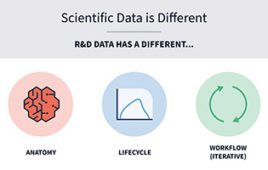 While there is no Hubble telescope gathering data about the universe of human development, projects to make large amounts of information — big data — more accessible to developmental researchers could bring behavioral science’s biggest questions into focus, according to a Penn State psychologist.
While there is no Hubble telescope gathering data about the universe of human development, projects to make large amounts of information — big data — more accessible to developmental researchers could bring behavioral science’s biggest questions into focus, according to a Penn State psychologist.
“Many people, when they think about big data, think about astronomy, or physics, or biology and cancer research, but, in fact, there are big data approaches to studying human development,” said Rick Gilmore, associate professor of psychology. “It’s exciting that we now have the opportunity to learn how people emerge through the developmental process by taking empirical work from large numbers of investigators and aggregating that data.”
In a review of big data in human development, Gilmore said that, in addition to learning more about human development, such collaborations could also make wearable data-collection and personalized medicine more powerful and useful.
“Behavioral science proposes really hard problems,” said Gilmore. “There are a lot of health conditions that have small subtle effects that, if we had access to larger data sets, we could better understand and treat those conditions, leading eventually to personalized treatments.”
The challenge, however, is that organizational and technological walls make much of this data inaccessible to researchers.
Gilmore, who released his findings in a recent issue of WIREs Cognitive Science, said that government and university databases around the world already hold large amounts of information, including for example, data from laboratory tests, survey results, brain images and videos. However, most government databases that researchers can access contain information about groups of people, not individuals, while other databases with data on individuals may be stored in a variety of formats that makes working with the data difficult for researchers.
“Developmental scientists can learn from past studies, but it’s still too hard for a researcher who wants to reuse another person’s data — to find it, to reuse it, get it in interoperable form — to eventually build upon it,” said Gilmore. “In the near future, we have to be focused on making this better.”
Increasingly, funders are driving the move toward more accessible, shareable science databases, he said.
“I think there’s a little bit of push and a little bit of pull,” said Gilmore “The pull for data sharing is coming largely from funders — like the National Science Foundation, the National Institutes of Health — as well as non-governmental funders, for example, the Gates foundation. The push is coming from within the community of researchers, who are recognizing, certainly within the behavioral sciences, that there have been questions raised about reproducibility and transparency in psychological science.”
As the technological questions are answered, researchers must also create a policy framework that will allow researchers to better manage big data projects while ensuring the privacy rights of subjects.
“There is a lot of sensitive data that people collect about human behavior in the behavioral sciences and social sciences that could be shared if those participants’ identities could be protected,” said Gilmore. He is co-director of the Databrary.org digital library that has developed policies and technologies to share research videos with the permission of research participants.




